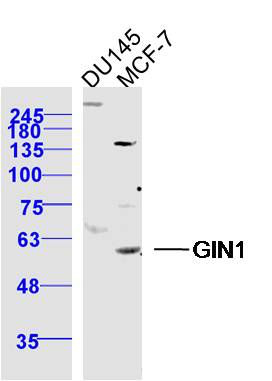产品货号 : mlR16245
英文名称 : GIN1
中文名称 : GIN1蛋白抗体
别 名 : FLJ20125; GIN-1; GIN1; GIN1_HUMAN; Gypsy retrotransposon integrase-like protein 1; TGIN1; Ty3/Gypsy integrase 1; ZH2C2; Zinc finger H2C2 domain-containing protein.
研究领域 : 细胞生物 免疫学 细胞类型标志物 表观遗传学
抗体来源 : Rabbit
克隆类型 : Polyclonal
交叉反应 : Human,
产品应用 : WB=1:500-2000 ELISA=1:500-1000 IHC-P=1:400-800 IHC-F=1:400-800 ICC=1:100-500 IF=1:100-500 (石蜡切片需做抗原修复)
not yet tested in other applications.
optimal dilutions/concentrations should be determined by the end user.
分 子 量 : 60kDa
细胞定位 : 细胞核
性 状 : Lyophilized or Liquid
浓 度 : 1mg/ml
免 疫 原 : KLH conjugated synthetic peptide derived from human GIN1:441-522/522
亚 型 : IgG
纯化方法 : affinity purified by Protein A
储 存 液 : 0.01M TBS(pH7.4) with 1% BSA, 0.03% Proclin300 and 50% Glycerol.
保存条件 : Store at -20 °C for one year. Avoid repeated freeze/thaw cycles. The lyophilized antibody is stable at room temperature for at least one month and for greater than a year when kept at -20°C. When reconstituted in sterile pH 7.4 0.01M PBS or diluent of antibody the antibody is stable for at least two weeks at 2-4 °C.
PubMed : PubMed
产品介绍 : GIN1 is a 522 amino acid protein containing one integrase catalytic domain. Widely expressed, GIN1 is also found in tumors originating from parathyroid gland, colon, stomach, bladder, uterus and prostate. Three isoforms of GIN1 are produced by alternative splicing events. The gene encoding GIN1 maps to human chromsome 5q21.1. Chromosome 5 contains 181 million base pairs and comprises nearly 6% of the human genome. Deletion of the p arm of chromosome 5 leads to Cri du chat syndrome, while deletion of the q arm of chromosome 5 altogether is common in therapy-related acute myelogenous leukemias and myelodysplastic syndrome. Treacher Collins syndrome, Cockayne syndrome and familial adenomatous polyposis are also associated with chromosome 5.
Subcellular Location:
Contains 1 integrase catalytic domain.
Tissue Specificity:
Widely expressed. Also found in tumors originating from parathyroid gland, colon, stomach, bladder, uterus and prostate.
SWISS:
Q9NXP7
Gene ID:
54826
Important Note:
This product as supplied is intended for research use only, not for use in human, therapeutic or diagnostic applications.
产品图片












